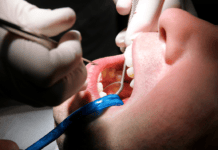Scientists at the School of Medicine at the University of Buffalo have conducted research which appears to prove patients who are diagnosed with type 2 diabetes can improve their health by taking better care of their oral hygiene. Their findings, “Benefits of Non‐Surgical Periodontal Treatment in Patients with Type 2 Diabetes Mellitus and Chronic Periodontitis: A Randomized Controlled Trial,” was recently published in the Journal of Clinical Periodontology.
A Closer Look at Type 2 Diabetes
Patients who are diagnosed with type 2 diabetes have a metabolic condition that prevents their body from properly using insulin. Insulin is a hormone that allows cells to convert glucose into energy.
The disease used to be associated with people who were middle-aged. However, as more Americans become obese and less physically active, type 2 diabetes is starting to become more common among young adults and children. Roughly 9 out of 10 people diagnosed with diabetes have type 2 instead of type 1. Common treatments for type 2 diabetes include medication, a healthy diet, and other lifestyle changes.
Symptoms of Type 2 Diabetes
Symptoms of type 2 diabetes include fatigue, weight loss, and increased thirst and hunger. Other common symptoms are more frequent urination and sudden loss of muscle bulk. The frequent urination is caused when the body tries to self-correct and flush out the extra glucose by causing the person to visit the bathroom frequently.
Patients who are overweight and not physically active are at risk of developing type 2 diabetes. Smoking, high blood pressure, and cholesterol can also increase someone’s risk of getting the disease.
Serious Health Complications
Over time, type 2 diabetes can cause serious health complications. High blood glucose levels can severely damage a person’s organs, blood vessels, and other bodily functions. Patients with the disease are also more likely to experience heart disease, stroke, or a heart attack due to clogged arteries, which disrupt the blood flow to the heart and brain. Extra glucose in the nervous system may also cause patients to feel a tingling sensation or “pins and needles” in their hands and feet. Diarrhea, vomiting, and constipation can occur when the nerves in the gastrointestinal tract are affected. Retinal damage, kidney disease, and foot ulcers are other health complications that patients with type 2 diabetes may experience.
The Study at the University of Buffalo
Researchers at the Faculty of Medicine and Health Sciences of the University of Buffalo conducted a randomized clinical trial to examine the link between dental hygiene and type 2 diabetes. The lead investigators were Miquel Viñas, a Microbiology professor and José López, a medical director at the Dental Hospital of the University of Buffalo.
For the study, they examined 90 patients who were diagnosed with type 2 diabetes for six months. The participants came in once a month, and the researchers measured their glycated hemoglobin. They also studied the participant’s populations of oral bacteria that could potentially cause periodontitis among other clinical parameters.
In Conclusion
By the end of the study, the scientists at the University of Buffalo were able to reveal a strong correlation between poor oral health and elevated glycemic levels and glycated hemoglobin. Overall, when patients were proactive and maintained good oral health, it had a positive effect on their type 2 diabetes, and drastically reduced their glycemic status and levels of glycated hemoglobin.











